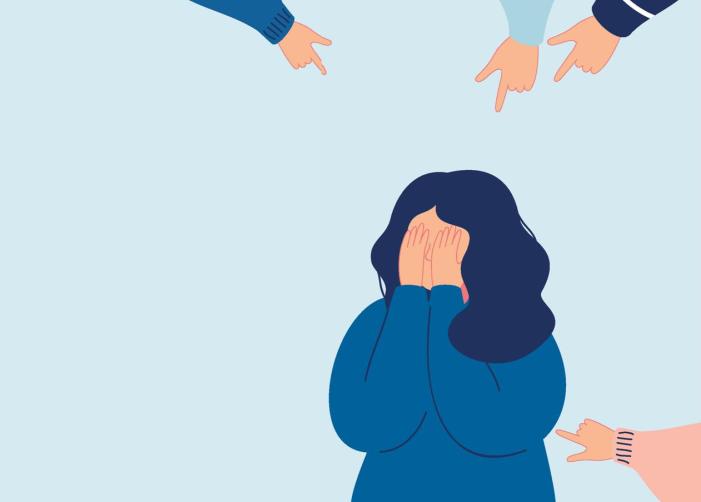Buying single-use plastic, forgetting to text your friend on their birthday, putting your feet up to watch Virgin River when you promised you’d do the ironing; everyone violates their moral code once in a while. In fact, a study* has revealed that the average Brit feels guilty for more than six hours a week, so with many of us experiencing this feeling on a regular basis, why is it perceived as a negative thing? We’ve borrowed the brains of the top experts in their field to help you harness guilt to your advantage.
The guilt trip
More often than not, guilt is an emotional response to having expectations placed on you that you were unable to meet and this is when your people-pleasing tendencies tend to show up without an invite. It makes sense, too. As a human, you’re hard-wired to do your best, plus nobody likes disappointing anyone. “Guilt enables you to work on bettering yourself and being fairer to others,” says Michael Padraig-Acton, a psychological therapist with over 30 years of experience (mpamind.com). “It puts you in a position of being an honourable, caring, thoughtful and kind human being. People who don’t have the ability to feel guilty are sociopaths or narcissists and therefore don’t learn from their mistakes.” If you’ve got an innate eagerness to please, it’s not exactly your fault. We’re taught, from a young age, that saying ‘no’ is rude or impolite and as such, we form a belief that saying the word makes us dislikeable, selfish and even unkind. “Guilt is an emotion that occurs when you feel responsible (rightly or wrongly) for having done something wrong and this inner dialogue often develops for people who were heavily relied upon as children – either physically or emotionally,” says Dr Elena Touroni, a consultant psychologist and co-founder of My Online Therapy (myonlinetherapy.com). An example of this might be having to look after a chronically ill or depressed parent, leading you to neglect your own needs, she comments. “Because of this, you might find yourself wracked with guilt anytime you need to assert yourself or uphold boundaries.”
Helpful guilt
That being said, some experts are quick to highlight the positive effects that can come with guilt. It can serve you in many ways and is a healthy reaction to something you shouldn’t have done or should have done better. The caveat? It needs to be justified. Although your brain can’t differentiate between healthy and unhealthy guilt, you can control your response to the two types. “Guilt can be helpful when the feeling allows you to seek forgiveness, take responsibility for the action, correct the behaviour and ultimately lead to healing,” states Dr Andreas Michaelides PhD, chief of psychology at Noom (noom.com). “The key component of helpful guilt is when it’s centred on a specific behaviour and results from an act that’s not aligned with your values,” he continues. Ever felt guilty for lying to your partner about something? Deep down you probably know that it was wrong to do, but viewing it as an isolated incident will help you reduce the chances of repeating this mistake in the future. When you ruminate about a situation, or if it was completely out of your control, that’s when guilt does absolutely zero for your wellbeing.
Pointing the finger
When you attach guilt to shame, it can come with a whole host of other feelings to bring you down further. Shame is deeply personal; you can internalise those feelings and start to beat yourself up. “Feelings of shame are associated with a sense of worthlessness and powerlessness, however guilt about a specific behaviour is linked with remorse and regret over the transgression,” says Dr Michaelides. “These emotions can prompt remedial actions, such as confessing and apologising, rather than hiding and denying, which often accompanies shame.” Dr Touroni echoes this and also says that experiencing guilt and shame at the same time is common. She advises owning up to your mistakes, so you’re less likely to be self-critical. “You may find you need to act in the opposite way to the shame, but still follow your urges associated with the guilt,” she says. “That means not hiding away, making your behaviour public, and then apologising and repairing any damage caused. This takes guts, but it’ll be worth it in the long run.”
Talk it out
Being weighed down by guilt is no way to live life and, with this in mind, Michael adds that there’s a fine line between justified guilt and simply being too hard on yourself.
“An unhealthy [sense of] guilt is one that you haven’t dealt with or, worse still, one that’s being forced upon you. For example, if somebody close to you passes away and you didn’t see them every Tuesday before they died or if you ended a relationship because it really wasn’t working for you, but the other person felt really hurt – these are types of unreal, unjustified and unreasonable guilt, which can stop you from functioning in your life as you should.” To help these forms stop interrupting your self-love and self-care, his formula is to take a softer approach for the sake of yourself and others. “You must, without any exception, be able to give yourself permission to see and feel guilt and then give yourself permission to understand it and your reactions towards the feeling, and ultimately forgive yourself.”
Change and growth
Remember that it’s perfectly OK to feel guilty – feelings are feelings and they’re always valid. But to help you unpack your baggage from that guilt trip, Dr Touroni advises that there are a number of techniques that can be used to challenge it so that it no longer interferes with your day-to-day life. “The first step to overcoming guilt is the realisation that it’s not your burden to carry. Do this by acknowledging why it’s there and be compassionate with yourself. You might even want to accept what you’ve learnt along the way. You’re likely to be naturally empathetic and this empathy needs to be directed to the right places. Most importantly, it should never be at the expense of your own wellbeing.” There’s also no shame in reaching out for help and, if you feel trapped in your guilt-shame cycle despite your efforts to break it, this is a sign that it may be time to consult with a mental health professional, says Dr Michaelides. Guilt can be an uncomfortable emotion to sit with, but once you’re in a position to come to terms with it, it can lead to change and growth.




















